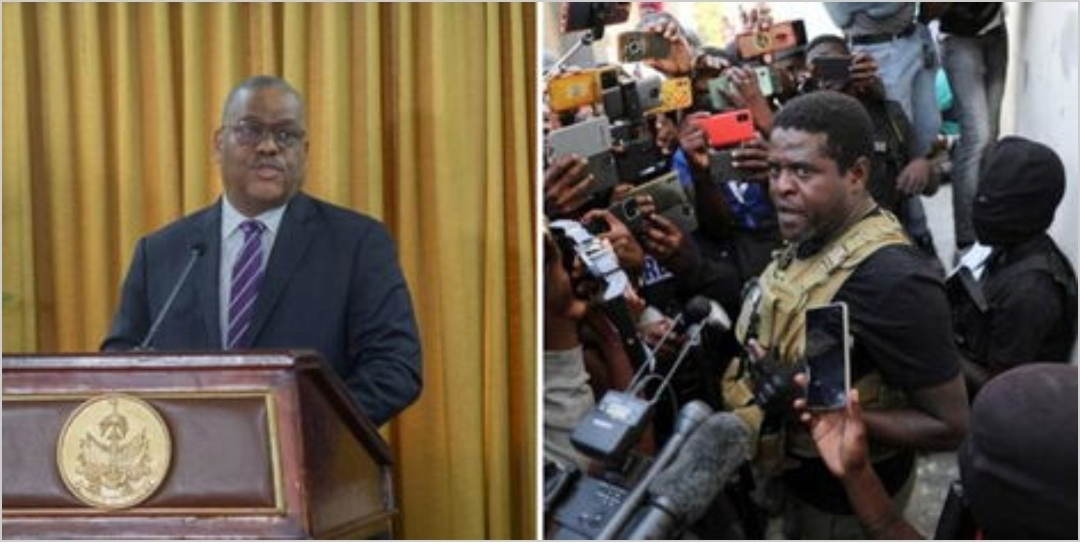A photo collage of Haiti Prime Minister Garry Conille (left) and gang leader Jimmy Cherizier alias Barbecue PHOTO YAHOO
Port-au-Prince, Haiti – In a heated escalation of Haiti’s ongoing violence, gang leader Jimmy Cherizier, widely known as Barbecue, has vowed to resist the Kenyan police forces deployed to Haiti.
In a video released on June 26, Barbecue denounced the Kenyan police as invaders and called on his followers to confront them forcefully.
Kenya dispatched its police to Haiti as part of a multinational mission aimed at stabilizing the Caribbean nation.
Haiti’s capital, Port-au-Prince, has suffered from severe gang-related violence, making it one of the most dangerous places in the country. President William Ruto of Kenya, who sent off the officers on June 24, hoped their presence would help restore peace.
Barbecue, who leads the notorious Viv Ansanm Coalition, sees these foreign forces as a direct threat to his operations and Haiti’s sovereignty. “I don't care if they are white or black,” Barbecue declared in his video message. “If they’re not Haitian and they’re on Haitian soil, they’re invaders.” He emphasized his readiness to fight for what he sees as the freedom and dignity of his country, even if it means facing death.
This strong rhetoric followed unsuccessful attempts to initiate peace talks with Haiti’s government. Barbecue had earlier indicated a willingness to discuss terms to end the violence but insisted his gang must be included in any negotiations. He warned that without their involvement, the conflict would only intensify.
Haiti gang leader Barbecue taking a stroll PHOTO DOMINICAN TODAY
Prime Minister Garry Conille responded firmly to Barbecue’s proposal. Conille stated that any dialogue would be conditional on Barbecue’s gang disarming and ceasing their illegal activities. “Lay down your arms and recognize the authority of the State before any arrangement,” Conille stated in a press briefing. He made it clear that the government would not engage with groups that continue to pose a threat to law and order.
Barbecue rejected these terms, arguing in an interview with Al Jazeera that his call for dialogue should not be seen as a sign of weakness or surrender. “It’s a fight for the country’s future,” he said, insisting that his intention was to find a solution that benefits Haiti rather than submitting to external pressures. He stressed that his fight would continue regardless of whether he survives, suggesting that other members of his gang are ready to take up the cause.
The arrival of the Kenyan police has heightened tensions in Port-au-Prince. Their mission is to assist the Haitian government and provide protection to civilians, but the escalating threats from Barbecue have increased the risks they face. These officers, part of a broader international effort, now find themselves in a highly volatile environment where the line between peacekeeping and direct confrontation is increasingly blurred.
Kenya’s involvement in Haiti’s crisis stems from a broader initiative to provide international support to countries struggling with internal conflict. The Kenyan police are part of a multinational contingent that includes forces from various countries, all working towards stabilizing Haiti. This deployment is seen as a critical step in international efforts to restore order and assist the Haitian government in reclaiming control over areas dominated by gangs.
The situation in Haiti remains complex and dangerous. The gangs, led by figures like Barbecue, have established significant control over parts of Port-au-Prince, often operating with impunity due to the weak presence of government forces. The international peacekeepers, including the Kenyan police, are tasked with a difficult mission: to support the local authorities, protect civilians, and create conditions for a more stable and peaceful environment.
President William Ruto flagging off officers being deployed to Haiti on June 24, 2024 (left) and police officers at the airport. PHOTO KITHURE KINDIKI
However, the threats from Barbecue highlight the challenges these peacekeepers face. Confronting entrenched gangs requires not just military might but also effective strategies to address the underlying issues fueling the violence. This includes addressing poverty, corruption, and the lack of opportunities that often drive individuals towards gang involvement.
The international community, along with the Haitian government, is closely monitoring developments, hoping for a resolution that avoids further bloodshed. The people of Haiti, caught between the gangs and the peacekeepers, are left hoping for a future where they can live in safety and peace.
Do you have a business and you need more customers?? Advertise with us and reach more people, get more profit. Whatsapp us 0732812783














0 Comments